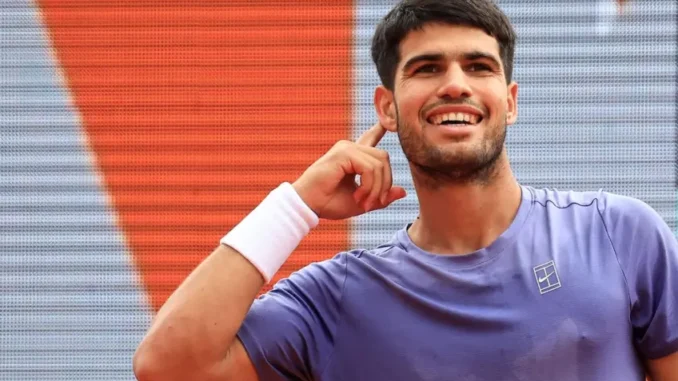
In the relentless grind of professional tennis, where the calendar stretches across continents and surfaces with barely a moment to breathe, Carlos Alcaraz has emerged as a beacon of balance, blending world-class athleticism with a zest for life. The 22-year-old Spaniard, a five-time Grand Slam champion and world No. 2, has mastered the art of stepping away from the court to recharge, and his annual pilgrimage to Ibiza has become a cornerstone of his success. Fresh off a dramatic five-set victory over Jannik Sinner at the 2025 Roland Garros, where he saved three championship points in a five-hour, 29-minute epic, Alcaraz opened up about why his brief escapes to the Spanish island are vital for sustaining his passion and performance amid a punishing schedule.
For Alcaraz, Ibiza isn’t just a party destination; it’s a mental reset button. After the grueling clay season, which saw him clinch titles in Monte-Carlo, Rome, and Paris, the young star jetted off to Ibiza for three days of sun-soaked relaxation with friends. “It’s kind of the middle of the season, so after the clay season, I think it is really, really intense, so after Roland Garros it is the best moment to go anywhere,” he said during a pre-tournament press conference at Queen’s Club. “My friends are going to Ibiza every year so I go to Ibiza as well. It doesn’t matter the place we go, it is time to refresh physically, mentally and go back to the grass season as good as I can.” This year’s trip, though shorter than the six-day escapade featured in his Netflix documentary *Carlos Alcaraz: My Way*, was no less impactful. “Ibiza a été très utile pour moi,” he declared after winning Queen’s, crediting the break for reigniting his hunger. “I’m not saying that I won because of the party, but those days went well for me.”
The documentary, released in April 2025, offered a glimpse into Alcaraz’s duality: a fierce competitor chasing tennis history and a 22-year-old craving normalcy. “I went there to have a blast,” he confessed in the series, recounting late nights and dancing but emphasizing restraint. His coach, Juan Carlos Ferrero, cautioned, “If you go to Ibiza for six days and go out every day, when you come back on the seventh day you have done everything but rest.” Yet, Alcaraz’s measured approach—limiting himself to three nights in 2025—proved effective. He returned to win Queen’s, his first grass-court title of the season, and reached the Wimbledon final, only falling to Sinner in four sets. “Profiter avec mes potes, me marrer, pour revenir sur le court avec plus d’énergie,” he explained, likening the break to a mantra that fuels his drive to “have envie de rejouer vite et de gagner.”
Alcaraz’s advocacy for rest extends beyond personal choice; he’s a vocal critic of the ATP’s grueling calendar. “We’re trying to change the schedule a bit, seeing if they can remove more tournaments so we can have more rest time, more vacation time. It’s not easy, but we’re trying,” he told reporters, echoing sentiments from peers like Iga Swiatek and Daniil Medvedev. The 11-month season, with mandatory events leaving little wiggle room, has sparked injuries and withdrawals, with Novak Djokovic and Sinner skipping the Canadian Open. “Sometimes it’s too many days in a row, too many weeks in a row,” Alcaraz said, admitting that without breaks, “that excitement kind of fades.” His post-Roland Garros trip to Ibiza, followed by time in southern Spain and two weeks at home in Murcia, left him “hungry for more in the American swing.”
His 2025 season, boasting a 48-6 record and five titles, including Rotterdam and a second French Open, underscores the value of these pauses. In Cincinnati, where he dug deep for a three-set win over Damir Dzumhur, Alcaraz’s energy was palpable. “I love having time for me, for myself,” he told Tennis Channel, his face lighting up. “For me, it’s needful to come back stronger and hungry to catch the racket and hit some balls.” As he prepares to face Hamad Medjedovic in the third round, with the US Open looming, Alcaraz’s Ibiza ritual—far from a reckless escape—emerges as a strategic lifeline, ensuring the charismatic Spaniard remains a force on and off the court.
Leave a Reply